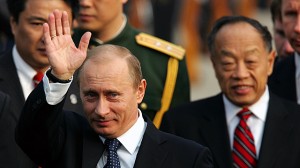UNITED NATIONS — George Orwell would have laughed at the very notion. Russian Premier Vladimir Putin has won a curiously-awarded Peace Prize for his military attack on Chechnya in 1999, and his “iron hand and toughness” in dealing with separatists near and far, the old fashioned way. For his bellicose actions, Putin was lauded as a figure, “outstanding in keeping world peace.”
“War is Peace,” extolled Big Brother’s ill-named Ministry of Truth in Orwell’s epic novel Nineteen Eighty-Four (1984). In fact, the rich political irony of the twisted political dialectic aptly fits the prize awarded to the Russian leader.

“His iron hand and toughness revealed in this war impressed the Russians a lot, and he was regarded to be capable of bringing safety and stability to Russia,” read the English language version of the committee’s statement. ”He became the anti-terrorist Number One and the national hero.”
The bitter insurgency fought by the Russian military against Islamic militants in Chechnya was marked by widespread human rights violations on both sides.
Qiao Damo, the president of the Confucius Peace Prize committee, stated: “Those wars were righteous wars. Mr. Putin fought for the unification of his country.” The conflicts were also aimed at separatists in both Chechnya and Georgia. Could this be a thinly veiled threat to rumblings of separatism in Tibet, Sinkiang, or even Taiwan?
But before the readers think the story is a spoof written into a P.J. O’Rourke book such as Give War a Chance, the facts are dead serious.
The Confucius peace Prize was set up to counter to last year’s genuine Nobel Peace Prize award to Chinese dissident Liu Xiaobo. When Prof. Liu won the Oslo accolade, a curious committee of sixteen “patriotic Chinese scholars” set up this farcical charade.
There were other contenders, among them German Chancellor Angela Merkel, American Microsoft founder Bill Gates, and South African President Jacob Zuma. Needless to say, Putin’s KGB secret police credentials no doubt sealed the deal.
Sadly the respected aura of Chinese sage Confucius is again being misused for political propaganda by the very forces in Mainland China who once attempted to discredit him. In the 1970′s the Chinese Communist Party’s virulent anti-Confucius Campaign reached fever pitch in trying to besmirch and then eradicate the thoughts of Confucius.
When the People’s Republic gained the “China seat” in the UN in 1971, one of the first things Beijing’s diplomats demanded was that a quotation of Confucius hanging in the UN headquarters, be removed at once as it “offended the New China!”
In today’s PRC of course, Confucius has been “reappraised” and regained his rightful standing. While the Confucius Peace prize is not being awarded through any official Chinese Ministry, a cynical canard to counter Liu Xiaobo’s Nobel no doubt came from on high.
One can only imagine that the Confucius Peace Prize committee is already sifting through a formidable list of contenders for next year’s award; among them Syrian President Bashar Assad to honor his bloody domestic crackdowns, Zimbabwe’s Comrade President Robert Mugabe for ruining the country, or a posthumous award to Libya’s Colonel Moammar Gadhafi for his forty year rule of terror.
Whether Vladmir Putin lists the Confucius Peace Prize among his foreign political accolades when he runs for Russian president next year is debatable. But if there is a positive story to come from this political farce, it would be to shed new light on the plight of Professor Liu Xiaobo and his continued incarceration.
John J. Metzler is a U.N. correspondent covering diplomatic and defense issues. He writes weekly for WorldTribune.com.

